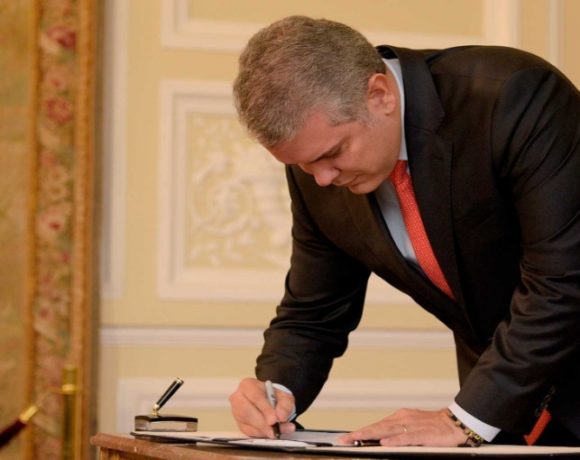President Duque Signs Social-Fiscal Reform Legislation; Aids Poor, Students, Small Business; Boosts Taxes on Wealthier Sectors

Colombia President Ivan Duque today (September 14) signed far-reaching tax and social-benefits legislation that promises to benefit more than 29 million poor- and middle-class Colombians — while also putting a heavier tax burden on wealthier individuals and corporations.
Not only is the legislation progressive — contradicting some biased media reports and some blowhards that paint Duque as a “right-wing” President — but also it’s remarkable that the bill passed both houses of Congress in the final months of a four-year presidential term. Getting anything done legislatively when Colombian presidents are leaving soon is almost unheard-of in Colombian politics.
The new law also “makes Colombia the first country in the hemisphere to carry out a social and fiscal reform in the midst of the pandemic,” according to Duque.
The bill aims to raise COP$15.2 trillion (US$3.97 billion) by raising the corporate income tax rate to 35%, cracking down on tax evasion, cutting non-mandated federal expenses, and continuing the existing financial-transfers tax and the ICA tax.
As for social benefits, the bill gives all students in lower-income strata (1, 2 and 3) free tuition at all public schools; extends the “solidarity income” subsidy for hiring young people; refunds the 19% value-added tax (VAT) to poorer people; extends the “emergency basic income” subsidy — created at the start of the Covid-19 pandemic — through 2022, and continues a variety of income subsidies for senior citizens, young people and poor families.
“Thanks to the application of the law, extreme poverty levels will be reduced from 15.1% in 2020 to 6.7% in 2022,” according to Duque. “Moderate poverty levels will also decrease from 42.5% in 2020 to 34.3% in 2022. In total, 4.1 million households will benefit from Solidarity Income, equivalent to 14.3 million people,” he added.
The employment subsidies included in the bill are projected to recover around 1 million jobs and help slash unemployment to levels prior to the pandemic outbreak.
“Every [temporary subsidy measure] that arose in the midst of the [Covid-19] complexities today becomes state policy thanks to the assistance of the political parties, unions, youth, governors and mayors,” Duque added, citing the broad coalitions that backed the new legislation.
“The Formal Employment Support Program [PAEF in Spanish initials] is historic for what it represents. This year, when we see the reactivation [of the national economy], we are not going to put it aside. On the contrary, we know that there are companies that are still affected and there are sectors that are just getting ahead and, therefore, retroactively, from May this year to December this year, the PAEF has also become an effective response to the needs of the Colombian people.
“And new elements are added: support for women, support for the population with disabilities, support, also, for those who were victims of the [‘Paro National’ riots and] blockades, those who wanted to destroy and who, too, were affected in their lives, in their income. They, too, are answered,” Duque added.
“But let it also be clear: The solution has not been at the cost of taking away competitiveness from the private sector, but of maintaining it — and I say this because of the following: this reform maintains the 100% VAT discount on capital goods. This reform maintains the elimination of presumptive income [from tax]. Because even with the increase in the nominal [corporate tax] rate [to 35%], it is still a rate substantially lower than the one we had in 2018 and, also, because the ICA tax deduction is left at 50%.
“In other words, the private sector contributes, but maintains the competitiveness gained in these years, to continue making Colombia an attractive place for foreign investment,” Duque concluded.
















